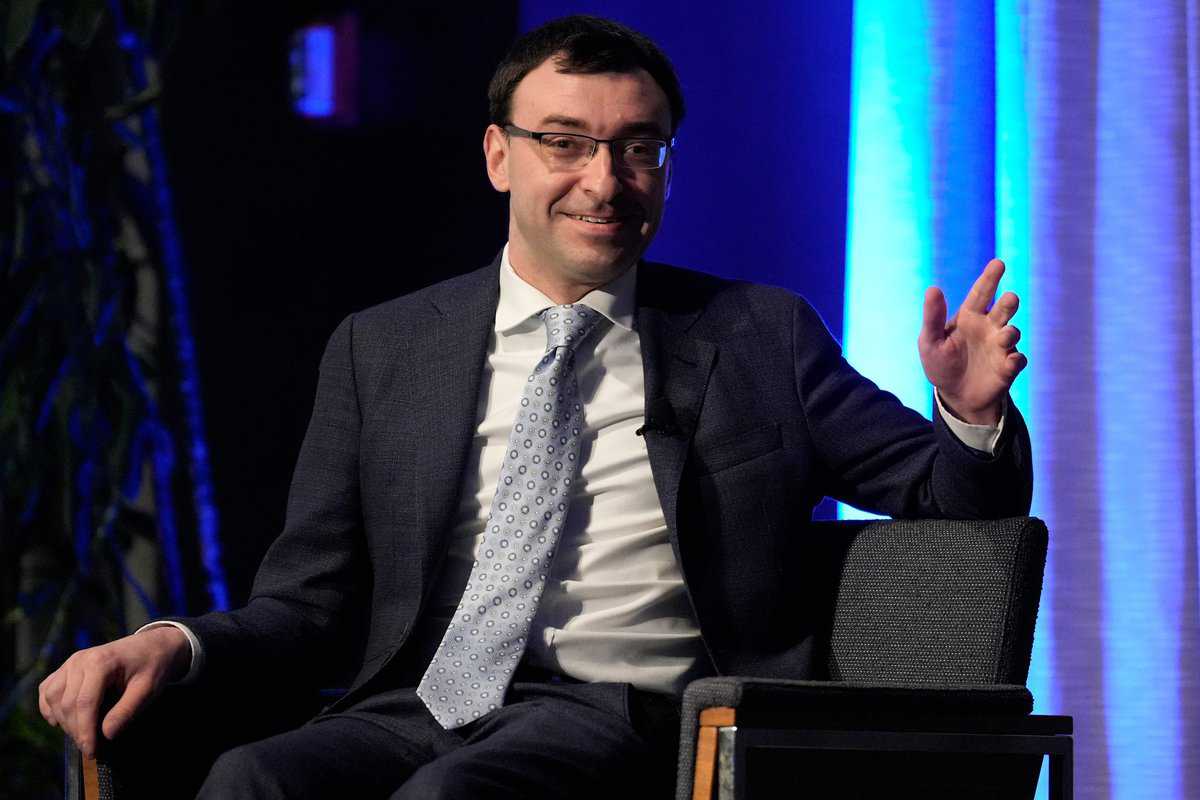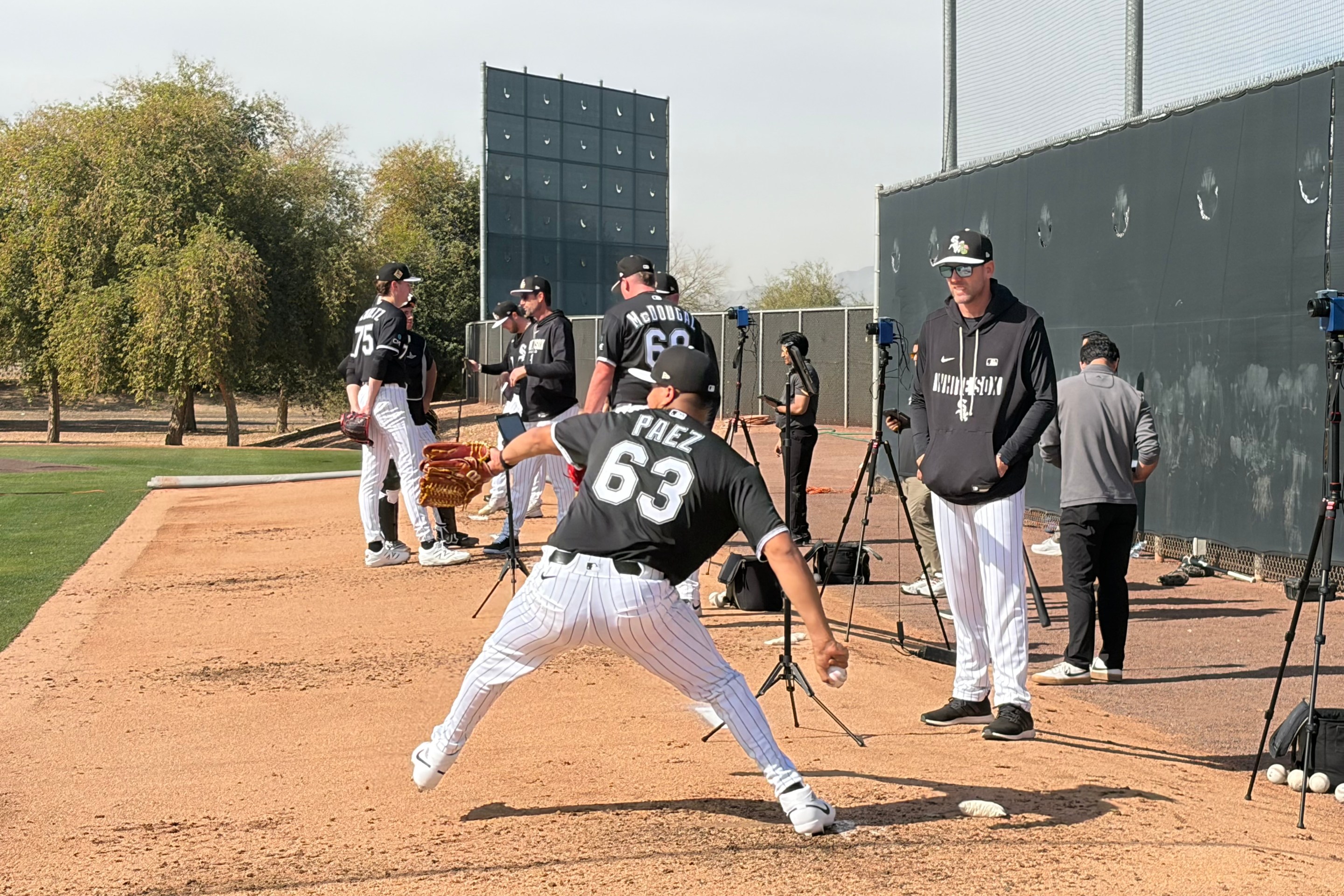As Tigers right fielder Wenceel Pérez toppled over backwards, a history-making catch nestled in his glove, a sellout crowd at Comerica Park erupted and an elated home dugout emptied out in celebration. White Sox radio play-by-play man Len Kasper had spent all season acknowledging his team's spiral toward the all-time record for losses, but could also see the lead story of the moment playing out in front of him.
"My call was very basic but it was, 'The Tigers clinch a playoff spot, and the White Sox lose their 121st game,'" said Kasper, who felt the order was dictated by the situation. "If someone tunes in and they don't know what the circumstances are, you would feel like the fans are cheering for something that happened to the visiting team, and it had nothing to do with that. Two things kind of come together, but I had made note to myself, don't forget why the fans are here."
"Brock Huard has taught me more than anyone I've worked with that the game in front of you is the thing," said Jason Benetti, the Tigers TV play-by-play announcer after eight seasons with the White Sox. "The thing that you just watched is what matters."
For Benetti, it was weighing how much his call of the Tigers earning their first playoff spot in a decade would be preparation versus reaction. He wound up weaving in a Ernie Harwell reference -- the Detroit broadcasting legend he revered and studied, though he never met -- but only when a poignant camera shot of catcher Jake Rogers standing alone on the field in awe of the moment allowed for time to connect the current Tigers accomplishment to the franchise's history.
"I'm here in part because of Ernie," Benetti said. "There is a care for this job because of Ernie and because of everyone who came before. This place loves sports announcers, which is a really cool thing for someone who's thrown his life at sports announcing. I read a couple of books about Ernie in the offseason but I didn't know if there was going to be an appropriate time to say something that I hope Ernie would have loved."
Benetti says he and the Tigers broadcast mentioned the White Sox closing in on the record in the seventh inning as part of normal conversation, and that he would have made it part of his game-ending call in a normal situation for the sake of acknowledging baseball history. But while he may still be relatively new to The Motor City, Benetti raves about the Tigers' reverence for their franchise history, and understood that this moment belonged, solely, to Detroit.
"People are going to talk about this team as the team that had the most losses in modern baseball history," Benetti said. "But to do that in a moment where the Tigers are in the middle of doing something so unbelievably improbable, that was an easy no for me."
The game meant too much to the Tigers for the White Sox being on the precipice of etching their nightmare campaign into history to even be a topic of conversation in the home clubhouse. After all, Benetti was taking off from his Fox college football assignment to call Tigers games through the weekend for this very occasion. After Benetti's time-splitting between the baseball schedule and nationally televised football broadcasts were such a fraught source of debate in Chicago, he describes a frictionless process with his new home.
"The Tigers and I have an agreement that if, if they're going to clinch, I'm going to be here," Benetti said. "The Tigers also said to me, we'll be flexible with you. If you need to go do football and it's going to affect your employment situation or whatever it is, we understand. It wasn't a decision. We didn't need terms. It's just: I'm here."
The Harwell appreciation is apropos, because it dives at the heart of Kasper's satisfaction with his work even as the team its centered around crumbled to historic lows, negatively affecting the lives of countless colleagues the veteran broadcaster counts as personal friends.
"I feeling for everyone involved, particularly those people whose careers and jobs depends on wins and losses," said Kasper, who still emphasized that he's as convicted in ever in his surprising decision from four years ago to leave the Cubs for the White Sox, really for the sake of leaving television for radio.
"It's been way more rewarding than I ever thought. I give my partner [Darrin Jackson] a lot of the credit. We've become best of friends. He's always got my back on the air. It really truly is a partnership. I feel like we've done our best work as these years have gone along. It's been very, very rewarding in that regard. I probably do drill down a little bit more and remind myself on the mechanics of being really good on the radio, the what, the where the ball is in a season like this. We probably have veered off on occasion to other topics that we might not normally in a year where the games have a little more importance."
Kasper idolized Harwell's work on the radio, driving his return to the medium. Radio broadcasters also get to work playoff games where as local TV announcers do not, and Kasper's arrival on the South Side coincided with the team entering what they expected to be a long run of contention. But that they are instead mired in a long-term rebuild that feels closer to the beginning than the end, is not something Kasper describes as a disqualifying impediment.
"No broadcaster I've ever met would ever take a job or leave a job based on how good or bad the team was on the field," said Kasper, who noted he's called plenty of 100-loss seasons before this one. "It just so happened that right when I got here the White Sox were right in the middle of their window. The only four playoff games I've called as a lead announcer were in 2021, so I'm already grateful that I had those. Everyone's disappointed that window closed as quickly as it did. I'm 53, my hope is I'm doing this for another 20-25 years. It does go in cycles. It can turn around quickly. I'm playing with house money in terms of teams I've been with that have been really good. But yes, the idea of a third World Series run with a third team for me would be incredible."
Floated the comparison that the White Sox, his hometown team, are like his birth family, and the Tigers who actively courted him based on love for his established professional work, are like his chosen family, and Benetti feels it hits the mark well enough. He also insists he was pretty happy with his work when the Tigers were eight games under .500.
"One of the best decisions I've ever made in my life was one of the toughest decisions I personally have made," Benetti said.
After his rotation of broadcast partners was in tumult early in the season, including the Craig Monroe scandal, Benetti raves about the rapport he's found with Andy Dirks and Dan Petry, and calling games for a team that "wants all of it, all of the stuff I do. Whether it's zany, analytical, straightforward, let's do the range. Let's enjoy the game. I'm extraordinarily grateful for that."
That said, he's really enjoyed seeing it all start to work. Benetti knew and had spoken to manager A.J. Hinch on several occasions before coming to Detroit and had a healthy respect for his baseball mind coming in. But watching the Tigers charge to a playoff spot while using openers more often that not, with one true star-level hitter healthy through the whole season, arranging a series of role players into a larger whole, turned it up a notch or three.
"He's an open book; he loves talking about strategy with people who want to know about strategy, and it's been a thrill to watch him work," Benetti said of Hinch. "This dude is like one of the smartest people I've heard talk about baseball, in the way he can deconstruct it, the way he can talk about matchups in an open yet novel way. This was easy because I know how to narrate that. That's kind of the way I've learned to see the game, with that novelty that A.J. uses to make this team what it is. That made it easy."
But that it can't always -- or in the White Sox case, can't often -- be that way, is also part of the work of being a baseball broadcaster.
"Everybody who does what I do has a different philosophy on this," Kasper said. "I feel like my job is to be the bedrock, the foundation of the everyday nature of a season. Even in the really good years, not that I tamp down the enthusiasm or the expectations, but I just try to provide perspective. For instance, you're having a really good year but have a five-game losing streak, people are going to panic because of recency bias. You just kind of remind people it's going to be OK. When everything is going great in a bad season, you still need to balance the 'everything is great' with 'here's the record.'"
That the 2024 White Sox played a lot of close games, usually felled by poor offense, late-game defensive misplays or bullpen meltdowns rather than starters getting rocked and the game being competitively over in the third inning, is meaningful from a broadcast perspective. Even the worst games don't drag like they used to anymore with the pitch clock. This is entertainment programming, and the White Sox certainly lost in dramatic fashion quite frequently.
"What you ask for as a broadcaster is just have a good game," Kasper said. "Even in a bad year, you can always have a good game. Garrett Crochet's provided a lot of those. Obviously the [Chris] Flexen narrative of him getting the win in his last start. You just try to pull out those little things while also acknowledging. Every day I mention the record, where the White Sox are in the standings. We mentioned when they lost their 121st that it was a record. You can't run away from those things."
Kasper and Jackson pride themselves on setting the scene, describing the action, explaining why it happened to a listening audience entirely dependent upon their voices to experience it. And they take no small level of satisfaction in feeling like they're better than ever at it.
But they'd also love to see it turn. Everyone would. Even people who have otherwise moved on.
"I feel for people going through that, because there are a lot of people at that organization who do great work," Benetti said. "The White Sox Charities folks do amazingly caring work and it hurts their ability, I would imagine, to do what they do. I don't want to see anybody through that. There's too much garbage in life to have your vocation, which is a game, bring negativity."






